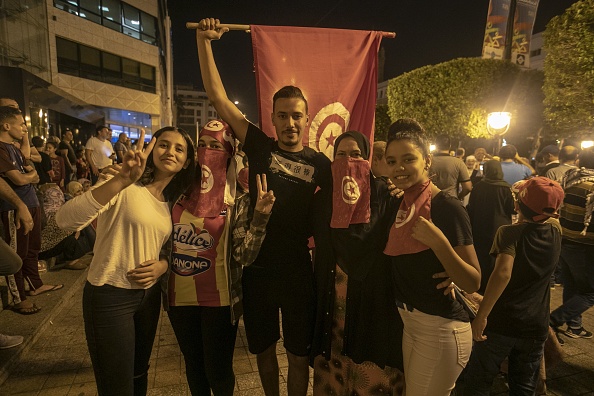THE MODEST ‘ROBOCOP’ OVERCOMES THE EXTRAVAGANT ‘NABIL MACARONI’
What distinguishes this election was just how different both candidates were in terms of their beliefs, campaign methods and mannerisms. Nabil Karoui was by far the controversial candidate since he was imprisoned earlier this year following allegations of money laundering and tax evasion, these charges were brought up by an independent anti-corruption group which has denied any political motivations behind its action. As a result, Karoui had to do most of his campaigning via his wife and party. Karoui earned the nickname, ‘Nabil Macaroni’ as his party distributed pasta to poor Tunisians in hopes of securing the poor vote. Giving away food to the needy isn’t an uncommon campaign practice in North Africa; back during the 2012 Egyptian elections the now-banned Muslim Brotherhood notoriously distributed sugar and cooking oil in Egypt’s poor districts. Karoui was eventually released and was able to join Saied in a televised debate, where he further advertised himself as the “people’s candidate” by speaking in the Tunisian dialect, rather than formal Arabic. Despite being imprisoned Karoui had a bigger campaign advantage as he had his party and a popular local channel (Nessma) on his side. Meanwhile, Kais Saied, by contrast, ran a relatively modest campaign in which he relied on door-to-door promotion, volunteers and openly invited people into his private office where they could ask him policy questions. One BBC report indicated that his office was teeming with businesspeople, and more importantly students who were curious about what he could do to the country’s economy and how he would tackle corruption. Saied was the more conservative out of the two candidates; he does not support equal inheritance between men and women, nor does he support LGBT rights. He is also in favour of reintroducing the death penalty, something that has been banned in Tunisia since 1994, as well as enacting a law that would punish unmarried couples who engaged in public displays of affection. Furthermore, his stoic and stern mannerisms have earned him the nickname “Robocop”. In spite of these views, young voters did not shy away from baking Saied as the vast majority of 18 to 25 year olds who voted in the election chose to back him.

IT’S THE ECONOMY, STUPID
Two of the biggest factors behind the Tunisian Revolution were youth unemployment and poverty. According to the World Bank, youth unemployment peaked in 2011, the year of Ben Ali’s ouster, as 42 percent of young people aged 15 to 24 were jobless. While this number steeply fell since then, it saw a gradual resurgence after 2014 and as of last year, youth unemployment is at 35 percent. Even though Tunisia’s poverty rate fell by 5 percentage points since 2010, the latest World Bank statistic still indicates that 15 percent of its population is below the poverty line.
Needless to say, the economy was one of, if not the largest, factor that was in voters’ minds, particularly the youth. While Karoui might have been the one who was giving away provisions, he failed to give any concrete economic reform promises and as a result, the youth were swayed by the candidate who seemed to have a better semblance of the future. The fact that Karoui was facing corruption charges didn’t help matters with the young vote either.
While the economy was a major deciding point in the election, it is unclear how Saied can tackle these issues since the president deals with foreign and defense policies, while the Prime Minister (who is chosen by the parliament) is the one that handles domestic affairs. Saied might follow the footsteps of his predecessors and interfere in the government’s policies, but he might end up shooting himself in the foot if he decides to that. Furthermore, the parliamentary elections resulted in a fragmented parliament which saw Ennahda gain the majority, while the newly formed Kalb Tounes came in second, this diversified chamber could lead to difficulties in forming a functioning government.









